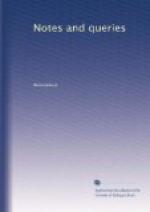“A manciple there was of the Temple.”
In Tyrwhitt’s edition of Chaucer, however, and in all other copies I have seen, the reading is
“A gentil manciple was ther of a temple.”
Now the difference between “the Temple” and “a temple” is not inconsiderable. I should feel obliged, therefore, by any explanation which will account for it. If Chaucer was, as he is sometimes pretended to be, a member of the Temple, it is somewhat extraordinary that he should have designated it so loosely. The words in the real passage would seem to have a more general signification, and not to be applied to any particular house of legal resort.
Edward Foss.
Family of Steward or Stewart of Bristol.—I have in my possession a drawing, probably of the time of James or Charles I., of the following arms. Azure a lion rampant or, with a crescent for difference, impaling argent a cross engrailed flory sable between four Cornish choughs proper—Crest, on a wreath of the colours a Saracen’s head full-faced, couped at the shoulders proper, wreathed round the temples and tied or and azure.
On removing the shield from the paper on which it was pasted, I found a spoiled sketch of the coat of Poulett, with the name Ambrose Moore written over it in a hand of about the reign of Charles I.: the object in passing the fresh shield over the spoiled coat appears to have been merely to make use of the mantling.
I have also a locket of silver gilt containing a miniature of a gentleman apparently of the time of the Commonwealth, finely executed in oils upon copper; on the back are engraved the arms and crest above described without the impalement, the crescent bearing the addition of a label. The only information I have is, that the locket and the drawing belonged to a family of the name of Steward or Stewart, who were clothworkers at Bristol during the Commonwealth, and for some generations later; and they are now in the possession of their descendants. The first of whom I have any authentic record is Hercules Steward, who was admitted to the liberties of the city of Bristol in 1623.
I cannot find that any family of Steward has borne the arms in question; and if any of your readers can throw a light on the matter, I shall feel greatly obliged to them.
Query. Was there a Herald painter of the time named Ambrose Moore?
O.C.
Feb. 26. 1850.
Paying through the Nose.—Can any one tell me the origin of the phrase, “Paying though the nose,” expressing a dear bargain?
A.G.
Memoirs of an American Lady.—Are the Memoirs of an American Lady out of print? They were written by Mrs. Grant, of Laggan, the authoress of Letters from the Mountains, and of whom some very interesting memoirs have lately been published by her son.
Nemo.
Bernicia.—Can any learned correspondent favour me with the name or title of any English nobleman who held authority in Wales, or the Borders, in 1370-80? The motive for this query is, that a poem of the time, by Trahaearn, a celebrated bard, contains the following passage:




